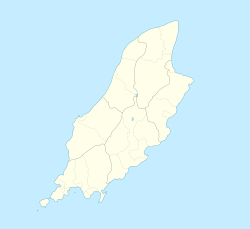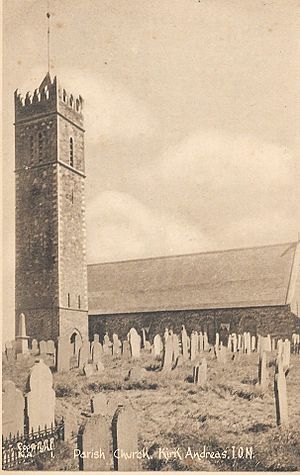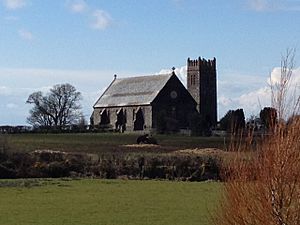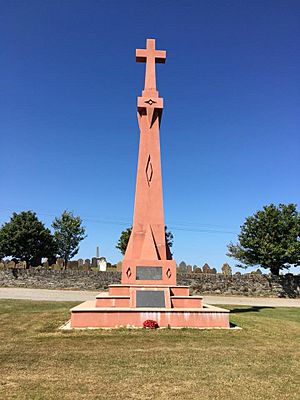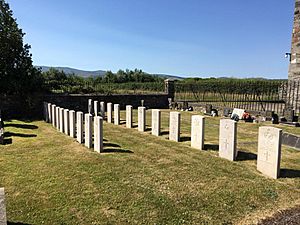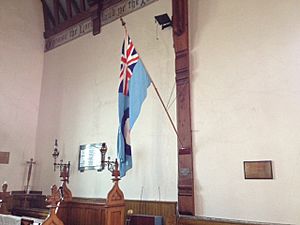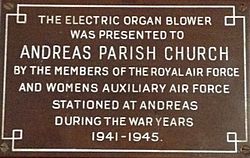St Andrew's Church, Andreas, Isle of Man facts for kids
Quick facts for kids St Andrew's Church |
|
|---|---|
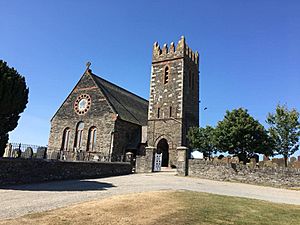
Saint Andrew's Church, located in the village of Kirk Andreas on the Isle of Man.
|
|
| 54°22′01″N 4°26′38″W / 54.367°N 4.444°W | |
| Location | Andreas, Isle of Man. |
| Country | Isle of Man |
| Denomination | Church of England |
| Tradition | Conservative evangelical |
| History | |
| Status | Parish church |
| Founded | 1821 |
| Dedication | Saint Andrew |
| Consecrated | 1 November 1821 |
| Architecture | |
| Functional status | Active |
| Style | Gothic Revival |
| Groundbreaking | 12th century (original church) |
| Completed | 1821 |
| Administration | |
| Parish | Andreas |
| Diocese | Diocese of Sodor and Man |
St Andrew's Church is a Church of England parish church in the village of Andreas, Isle of Man. A parish church is the main church for a local area, called a parish. This church is part of the Diocese of Sodor and Man.
Contents
The Church's Long History
It's believed that Christianity first came to the Isle of Man with St Patrick around the 5th century. Early Christians built many small chapels across the island. One of these was called Cabbal Vaartyn, which means Martin's Chapel. It was named after St Martin, who was known for being a very holy man.
Later, between 1270 and 1344, the Isle of Man was ruled by Scotland. During this time, the island was divided into parishes. The parish of Andreas built a church and named it after St Andrew, the patron saint of Scotland. This is where the name "Andreas" comes from.
Building a New Church
By the year 1800, the old church was falling apart. A meeting was held to plan for a new one. The Duke of Atholl, an important leader at the time, attended the meeting. It was decided to build a new church, but work didn't start for a few years.
Building the new church cost a lot of money. Much of it was paid for by donations from people in the community. The rest was paid by local landowners and cottage owners. The church's leader, called the rector, paid for the area around the altar, which was a common tradition.
The new church was built by a local man named Mr. Radcliffe. Since there was no stone quarry in the parish, stones were brought all the way from Sulby Glen. To save money, many slates from the old church roof were used again on the new building.
The Famous Tower
The church originally had a spire, but over the years, many changes were made. Between 1867 and 1869, a brand-new tower was built next to the church. The first stone was laid on May 30, 1867.
This new tower was very impressive. It stood 120 ft (36.6 m) tall and could be seen from all over the flat northern part of the Isle of Man. It had a large bell inside and was decorated with granite circles made from a split farm roller that a farmer had donated.
Why the Tower Was Shortened
In 1941, during World War II, an airbase called RAF Andreas opened nearby. The tall church tower was a danger to planes taking off and landing. The Air Ministry was given permission to put a warning light on top of the tower.
Later, the Air Ministry ordered the tower to be made shorter. The middle section was carefully taken down, and each stone was numbered. The plan was to rebuild the tower to its full height after the war ended. However, this never happened, and the numbered stones mysteriously disappeared.
Remembering the Heroes
A very important feature at the church is the Andreas War Memorial. It was built to remember the people from the parish who died during World War I and World War II.
The memorial was designed by a local resident, Cosmo Kendall. It was built by 85 volunteers from the parish who gave their time for free. The money for the materials was also donated by local people.
The memorial is a tall, four-sided pillar called an obelisk. It is made from 132 tons of red sandstone and stands 41 ft (12.5 m) high. It was officially unveiled on November 9, 1924.
Military Graves
In the churchyard, there is a special area with 23 military graves. These are looked after by the Commonwealth War Graves Commission. The graves belong to pilots and trainees from the nearby RAF Andreas airbase who died during World War II.
Among those buried here are the commanding officer of RAF Andreas, Wing Commander Teddy Knowles, and Major Geoffrey Waite. They were in charge of the airbase and its defense. They died in a plane crash on August 23, 1942.
The Church Today
Today, St Andrew's Church is still an active and important part of the Andreas community. The church proudly remembers its strong connection to the Royal Air Force. The RAF Ensign, the official flag of the RAF, is still displayed inside the church.
Notable People Buried Here
- Jeffrey Quill: A famous pilot who was the Chief Test Pilot for Vickers Supermarine. He was known for helping to develop the legendary Supermarine Spitfire airplane during World War II.
Gallery
- St Andrew's Church, Andreas
See also
- RAF Andreas
- Andreas (village)
- Andreas (parish)
 | Leon Lynch |
 | Milton P. Webster |
 | Ferdinand Smith |


